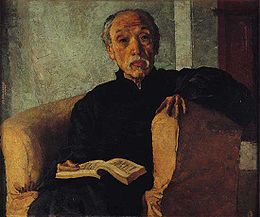music.wikisort.org - Poète
Chen Sanli (chinois simplifié : 陈三立 ; chinois traditionnel : 陳三立 ; pinyin : ), né le sur le Xian de Xiushui dans la province du Jiangxi, en Chine de la Dynastie Qing et décédé le , est un poète hakka chinois, issu de la noblesse.
Chen Sanli
Portrait de Chen Sanli par Xu Beihong
| Naissance | Xian de Xiushui |
|---|---|
| Décès |
(à 83 ans) |
| Prénom social |
伯嚴 |
| Nationalité |
Chinoise |
| Activité |
Poète |
| Père |
Chen Baozhen (en) |
| Conjoint |
Yu Mingshi (d) (de à ) |
| Enfants |
Shizeng Chen (en) Chen Yinke |
En Chine, il est aujourd'hui rassemblé avec Tan Yankai (谭延闿, ), et Tan Sitong (chinois : 谭嗣同 ; pinyin : ), sous l’appellation des « Trois princes de Hubei-Hunan » (湖湘三公子, ), et avec Tan Sitong, Ding Huikang (丁惠康, ) et Wu Baochu (吴保初, ), les « Quatre princes de la réforme » (维新四公子, ).
- Portail de la poésie
- Portail de la Chine
На других языках
[en] Chen Sanli
Chen Sanli (23 October 1853 – 14 September 1937) aka Boyan, Sanyuan Laoren, was a Chinese poet who wrote in the classical style in the early modern era. He was born in Yining (now Xiushui), Jiangxi Province [Kowallis, p. 169]. His father was Chen Baozhen, Qing dynasty governor of Hunan. Along with Zheng Xiaoxu and Shen Zengzhi, he became one of the leading figures of the Tongguang school, which was related to but not identical with the Song poetry style [Kowallis, pp. 168–208]. From 1889 Chen Sanli served as a civil servant, and with his father Chen Baozhen (1831-1900), the governor-general of Hunan and an associate of Tan Sitong and Kang Youwei, he led local reform in Hunan, which became a model in the minds of reformists for the entire country. After the Empress Dowager suppressed the Hundred Days Reform of 1898, the Chens were forced to leave the government and go into internal exile near Nanchang. His father died shortly thereafter, which greatly saddened the son. He then moved to a villa he built outside Jinling (Nanjing) called Sanyuan Jingshe (The Sanyuan Retreat), from which Chen Sanli derived his pen-name. After the 1911 Xinhai Revolution, Chen Sanli declined to serve in government under the Republic, but he was not a Qing yilao [loyalist] in the classic sense. After the Marco Polo Bridge Incident, he is said to have committed suicide by starvation in protest at the Japanese invasion.- [fr] Chen Sanli
Текст в блоке "Читать" взят с сайта "Википедия" и доступен по лицензии Creative Commons Attribution-ShareAlike; в отдельных случаях могут действовать дополнительные условия.
Другой контент может иметь иную лицензию. Перед использованием материалов сайта WikiSort.org внимательно изучите правила лицензирования конкретных элементов наполнения сайта.
Другой контент может иметь иную лицензию. Перед использованием материалов сайта WikiSort.org внимательно изучите правила лицензирования конкретных элементов наполнения сайта.
2019-2025
WikiSort.org - проект по пересортировке и дополнению контента Википедии
WikiSort.org - проект по пересортировке и дополнению контента Википедии
